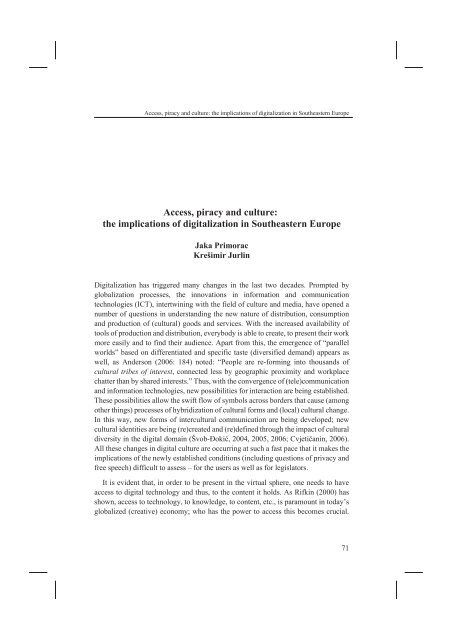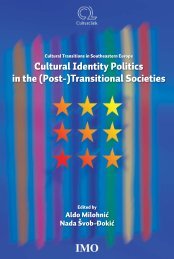D:\Documents and Settings\Ana\My Documents\Biserka-knjiga ...
D:\Documents and Settings\Ana\My Documents\Biserka-knjiga ...
D:\Documents and Settings\Ana\My Documents\Biserka-knjiga ...
Create successful ePaper yourself
Turn your PDF publications into a flip-book with our unique Google optimized e-Paper software.
Access, piracy <strong>and</strong> culture: the implications of digitalization in Southeastern Europe<br />
Access, piracy <strong>and</strong> culture:<br />
the implications of digitalization in Southeastern Europe<br />
Jaka Primorac<br />
Krešimir Jurlin<br />
Digitalization has triggered many changes in the last two decades. Prompted by<br />
globalization processes, the innovations in information <strong>and</strong> communication<br />
technologies (ICT), intertwining with the field of culture <strong>and</strong> media, have opened a<br />
number of questions in underst<strong>and</strong>ing the new nature of distribution, consumption<br />
<strong>and</strong> production of (cultural) goods <strong>and</strong> services. With the increased availability of<br />
tools of production <strong>and</strong> distribution, everybody is able to create, to present their work<br />
more easily <strong>and</strong> to find their audience. Apart from this, the emergence of “parallel<br />
worlds” based on differentiated <strong>and</strong> specific taste (diversified dem<strong>and</strong>) appears as<br />
well, as Anderson (2006: 184) noted: “People are re-forming into thous<strong>and</strong>s of<br />
cultural tribes of interest, connected less by geographic proximity <strong>and</strong> workplace<br />
chatter than by shared interests.” Thus, with the convergence of (tele)communication<br />
<strong>and</strong> information technologies, new possibilities for interaction are being established.<br />
These possibilities allow the swift flow of symbols across borders that cause (among<br />
other things) processes of hybridization of cultural forms <strong>and</strong> (local) cultural change.<br />
In this way, new forms of intercultural communication are being developed; new<br />
cultural identities are being (re)created <strong>and</strong> (re)defined through the impact of cultural<br />
diversity in the digital domain (Švob-Ðokiæ, 2004, 2005, 2006; Cvjetièanin, 2006).<br />
All these changes in digital culture are occurring at such a fast pace that it makes the<br />
implications of the newly established conditions (including questions of privacy <strong>and</strong><br />
free speech) difficult to assess – for the users as well as for legislators.<br />
It is evident that, in order to be present in the virtual sphere, one needs to have<br />
access to digital technology <strong>and</strong> thus, to the content it holds. As Rifkin (2000) has<br />
shown, access to technology, to knowledge, to content, etc., is paramount in today’s<br />
globalized (creative) economy; who has the power to access this becomes crucial.<br />
71



